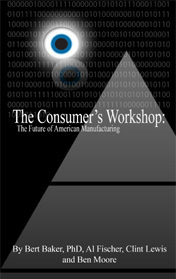Learnings from the ReShoring Summit
Back in March, I was a sponsor of the Re-shoring Summit in Cleveland, OH. Reshoring is when companies bring manufacturing that they have off-shored back to the United States. Manufacturing has been in decline in the United states going from 22% of non-farm payroll in 1977 to just 9% of non-farm payroll in 2012 in part due to off-shoring and factory automation. Below are some of the learnings from the Re-shoring Summit.
“Companies are beginning to realize that having offshored much of their manufacturing and supply operations away from their demand locations, they hurt their ability to meet their customer’s expectations”, from Accenture 2011.
Drivers of Reshoring:
Barriers to Reshoring:
-
Domestic labor cost
-
Tax Structure
-
Infrastructure
-
Skilled labor
Industries with Increased Reshoring Movement:
In particular, manufacturing operations in the Midwest, will see increased Reshoring activity because of low energy costs and other regional advantages. “Our economy will experience a sustainable competitive advantage in manufacturing over the next several decades as a result of low energy prices created by the abundant natural resources in our region (OH-PA-WV) by Steve Adelkoff of Renewable Manufacturing Gateway.
Bottom line, if you are a US Manufacturer, there are enormous opportunities to grow your operation due to overall costs and location of customers making you more globally competitive, however, you have to make sure you have optimized your production by:
-
Standardizing the components in your products
-
Systematizing the processes for production
-
Better Leveraging Your Engineering Workforce for Improved Productivity and Profitability
-
Building a System to deliver Mass Customized Products with near Mass Production Efficiency
These are all things we help manufacturing organizations achieve. Feel free to read my book – The Consumer’s Workshop: The Future of American Manufacturing and let us know how we can help you achieve these objectives.
Thanks,
Ben Moore
President
Agent Technologies, Inc.
|
|
The Consumer's Workshop: the future of American manufacturing
The Consumer's Workshop: The Future of American Manufacturing is a hand book on how to setup the systems within your company and create the workforce you need to be successful now and in the future. Written by authors that have worked at some of America's largest manufacturers, founded their own manufacturing organizations and helped numerous small manufacturers grow.
The Consumer's Workshop: The Future of American Manufacturing is a must read for today's business leaders. It is insightful and provocative in its approach to where US manufacturing has been, how manufacturing got into the troubles it faces today and what we need to do to become the standard for world class once again. If we want to know how to regain that competitive edge once again, the roadmap is certainly the pages of The Consumer Workshop.
-- Bruce Vaillancourt,Director, NIST MEP Program, TechSolve, Inc.
 The Consumer's Workshop is an extremely timely review of how manufacturing strategy developed in the past The Consumer's Workshop is an extremely timely review of how manufacturing strategy developed in the past
and how it will change in the future. The author team clearly demonstrates that companies have to change -- and provide plenty of advise how such a change should take place."
-- Frank Piller, PhD, International Manufacturing Consultant
As the authors make clear, eventually American manufacturing will become the workshop for direct production of consumer's own designs -- or it will be no more. Begin that path by following the steps outlined here."
-- B. Joseph Pine II, author, Mass Customization: The New Frontier in Business Competition
Investment: $12.99
| |
| In This Issue |
|
Learnings from the ReShoring Summit |
| xRP: Free 30 Day Trial |
|
Manufacturing Statistics June 2013 |
|

Online CRM / ERP Solution



Base Subscription:
$9 per Month per User

|
|
Manufacturing Statistics
1) Industrial production increased 0.4% in March 2013. Manufacturing production decreased 0.1% in March 2013. Source: Federal Reserve Board
2) Nonfarm payroll employment increased by 165,000 in April 2013. Manufacturing employment remained unchanged. Unemployment rate remained at 7.5% nationally. Source: Bureau of Labor Statistics
3) Manufacturing Trade Deficit decreased to $38.8 billion in March 2013 on exports of $184.3 billion and imports of $223.1 billion. Sources: Census Bureau, Bureau of Economic Analysis
4) New orders for durable manufactured goods in March 2013 decreased $13.1 billion or 5.7% to 216.3 billion. Source: Census Bureau
5) Inventories of manufactured durable goods in March 2013 increased $0.3 billion or 0.1% to $377.2 billion. Source: Census Bureau
| |